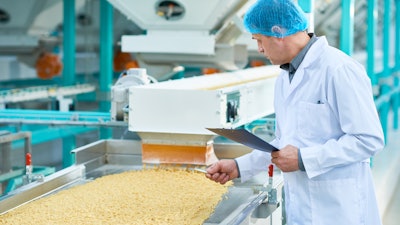
In the 1960s, NASA, the Pillsbury company and the US Army Laboratories came together to solve a particular problem of the Space Race: the safety of the food being sent to astronauts during their journey into outer space. In this completely new environment, far from the earth and with the potential of unforeseen circumstances, how would one ensure that astronauts are not in danger of contracting a food-borne illness? As a solution to this predicament, the HACCP system was born.
HACCP is an abbreviation for Hazard Analysis Critical Control Point and is considered to be one of the first Food Safety Management Systems ever created. It involves the analysis of a process to predict hazards and place contingencies on how to correct them. As NASA, the Pillsbury company & US Army laboratories discovered, the principles of the HACCP system can be applied to any food establishment, thereby cutting the risk of food-borne illness ten-fold. But with consumer demands and globalization, food technology and trends have seen a massive shift from the 1960s to the early 2020s. So, in such a scenario, how does one ensure that this age-old system can still be effectively used in the food industry? There is no straightforward answer, but there are certain factors that can take into consideration when implementing a HACCP system, to ensure its ready effectiveness:
Prerequisite programs: Prerequisite programs are protocols expected to be in place in an establishment BEFORE the implementation of a HACCP system. Colloquially known as PRPs, they are a requirement to ensure that safe food is guaranteed at the base level of production. Important PRPs such as Cleaning & sanitization and Facilities are essential in ensuring a smooth operational flow within a food establishment; without these factors, implementing a HACCP plan would be nearly impossible and hardly have any impact on the safety of the food product itself. Thus, the implementation of PRPs is important to prepare a food facility for HACCP Implementation.
 iStock
iStock
The HACCP team: One of the most important preliminary steps needed before diving into the creation of the actual HACCP plan is the assembling of the HACCP Team. The HACCP team should ideally be a diverse team consisting of experts from multiple disciplines, such as food microbiology, production, legal, engineering, sanitation, and quality assurance. This ensures that any ambiguities in regards to the process flow of operations will be kept to a minimum, and also guarantees that in the event of a revision and/or revamp of the process flow itself, there will be experts to determine the best course of action for the same. Additionally, hazard analysis is a complex task, and requires expertise in various fields, some of whom may not be a part of the permanent HACCP team; in such cases, bringing in third-party experts to consult on such matters is an up-and-coming trend in the food industry.
Revision and Review of a HACCP plan: In this day and age, with consumer demand constantly evolving, it is a requirement that most brands in the food industry today introduce new and exciting products into the market. But in such a scenario, how does one account for the obvious changes in the process flow, and the subsequent hazards that may come along with it? As a contingency, the HACCP plan is capable of being revised to fit in any new processes that might come into the picture; it is common protocol to have the HACCP plan reviewed every 6 months to ensure all processes are accounted for. Any new checklists and/or corrective actions can also be implemented if required; thus, regular review ensures the continuity and effectiveness of the HACCP plan.
Education and Training: Before delving into the preliminary steps of setting up a HACCP system, it is important for employees of a food establishment to understand the necessity and importance of the same; this includes everyone from management level to ground-line staff. Additionally, the implementation of a HACCP system may introduce a number of new procedures into the process flow, which can be intimidating for untrained employees. As ground line staff are the first line of defense against any potential issues in the HACCP process flow, it is important to ensure that effective training schedules for all management levels be created and executed, which should cover topics such as the Importance of HACCP, New Checklists, Importance of Documentation, CCPs, and Critical Limits, amongst others.
Selection of Corrective Actions: Corrective actions are procedures one must follow in the event of a deviation from a Critical Control Point; corrective actions tend to differ drastically according to the Critical Control Point and Critical Limit in question. But more importantly, corrective actions ensure that a HACCP system is running smoothly, and can be put back on track in the event of an unforeseen deviation. A significant factor to consider when devising a corrective action is the quickness in implementation, and of course, how to ensure there is minimal waste and damage to products/equipment of the process flow. Integrating these two factors into corrective actions ensures that process flow will be more or less smooth and that there will be minimal monetary losses as well.
A HACCP plan, of course, involves a significantly large number of factors in its final implementation; the five preliminary steps preceding the creation of a HACCP plan, all the way to the 7 principles of HACCP (i.e., Conducting a Hazard Analysis, Determining CCPs, Determining Critical Limits, Establishing Monitoring Procedures, Establishing Corrective Actions, Verification Procedures and Record-keeping). But the sheer diversity in HACCP plans according to Food Type, Consumer Type, etc. means that there is always a possibility of other external factors which may be essential for the successful execution of the same. Therefore, the 7 principles of  Violetta Njunina
Violetta Njunina
Violetta Njunina is the Head of Sales at FoodDocs and is an experienced restaurant and event manager with a demonstrated history of working in the food & beverages industry.























